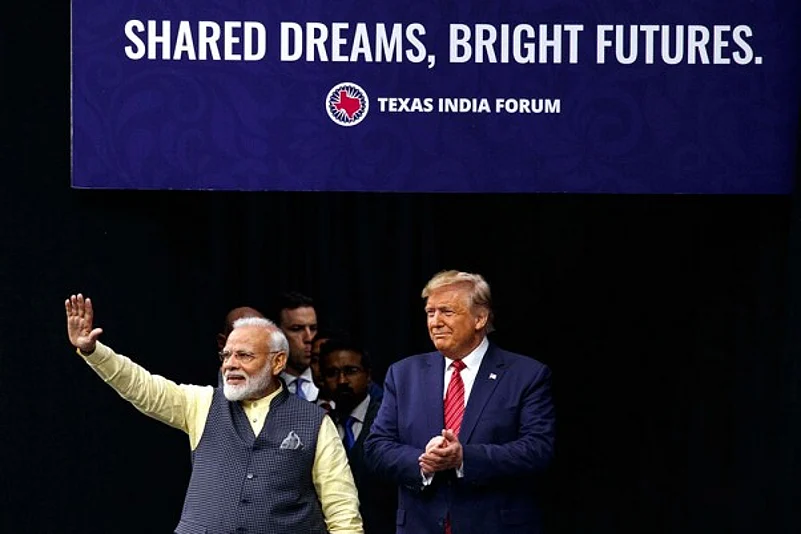The hype that “Howdy Modi!” extravaganza on September 22 would immediately usher in rich policy dividends was based on an inadequate understanding of America’s decision-making process.
The United States has many pockets of “Power”. It is an exemplar of “checks and balances” between the Executive, the Legislature and the Judiciary working in a “dynamic tension”, as described by the Late Senator John Tower during the Iran-Contra Scandal enquiry.
Hedrick Smith in his monumental work “The Power Game -- How Washington Works’ (1988) says: “Power floats -- it shifts and does not reside in the White House; The President is always part of the power mix but not necessarily the central part”.
US Congress created scores of Committees since the Nixon era for Governmental control “each taking charge of a slice of federal policy”. Congressional Committees have effective powers over new bills and amendments. Senate has overriding powers over appointments to higher posts. Congressional Committees can delay government action by holding open televised hearings of senior public servants to influence public opinion.
An example is their budget. The Presidential “request” is submitted to the Congress in February on new policies and funding. The Congress responds by drafting “Concurrent Congressional Budget Resolution”, sometimes watering down President’s proposals and creating new items. The “Appropriation” Committee in each house, while allocating funds, may introduce policy changes and “riders” (called “stealth legislation”) binding on departments.
US Congressional parties do not follow the same party discipline as in India. Eleven Senate Republicans joined the Democrats on September 25, 2019, in voting against Trump’s proposal to utilise state funds for border fencing.
The President can veto the entire budget, but it will have adverse effects like Government “shutdowns”. A bill permitting Presidential “Line item veto” passed in 1996 was struck down by the Supreme Court in 1998 although 43 of the 50 State governors enjoy that power.
As a result, individual US departments project their own policy pronouncements based on legal, bipartisan and national interests. That is how one sees the wide gap between their action and what is projected to us through the “Howdy Modi” events.
Thus we saw Alice Wells, Assistant Secretary of State speaking at the United Nations on September 26 conveying that US was “concerned by widespread detentions, including those of politicians and business leaders, and the restrictions on the residents of Jammu and Kashmir”. She said she looked forward to the resumption of political engagement with local leaders and the scheduling of the promised elections at the earliest opportunity.
On October 2, a State Department spokesperson nearly contradicted our external affairs minister’s claim that he was “reasonably convinced” of having been able to persuade US to avoid sanctions on India’s purchase of Russian S-400 missiles. On October 3, US Commerce Secretary Wilbur Ross termed the Houston claim on trade deal as “only speculation”.
A study of the “Countering America’s adversaries through sanctions Act” (2017) would indicate how Congress had compelled a reluctant President to sign this law despite his protests.
Hyperbolic announcements like what was published by India West, a US-based ethnic paper, that our PM’s “call upfront for Trump’s victory” (“Ab ki bar Trump Sarkar”) had marked “a completeness of alliance between the two countries as equal partners” has annoyed Democrats who had also attended the function.
Presidential hopefuls like Bernie Sanders and Elizabeth Warren protested at the human rights violations in Kashmir. Democrat Congressman Brad Sherman, Chairman of the US House Sub-Committee on Asia is holding hearings on human rights in South Asia on October 22, particularly in the Valley, Sri Lanka and on Muslims in Assam.
Finally, US agencies keep a close watch on Diaspora movements as their activities have domestic security implications due to dual loyalty, funds flow and efforts to influence American policies through different means, including espionage.
Since 2001 terrorism is another factor. US military’s professional journal Military Review’s March-April 2018 issue has carried excerpts from Samuel Huntington’s 2004 book “Who are we? The Challenges to America’s National Identity”, and visuals of PM’s Madison Avenue rally on 28 September 2014 as preamble.
Also highlighted are how foreign powers’ policy clashes and Diaspora’s money power end up exacerbating tensions during US elections, quoting the 1996 South Dakota Senate Elections resulting in the defeat of Senator Larry Pressler by Pakistan Diaspora.
(The writer is a former Special Secretary, Cabinet Secretariat. Views are personal.)



















.jpg?w=200&auto=format%2Ccompress&fit=max)






